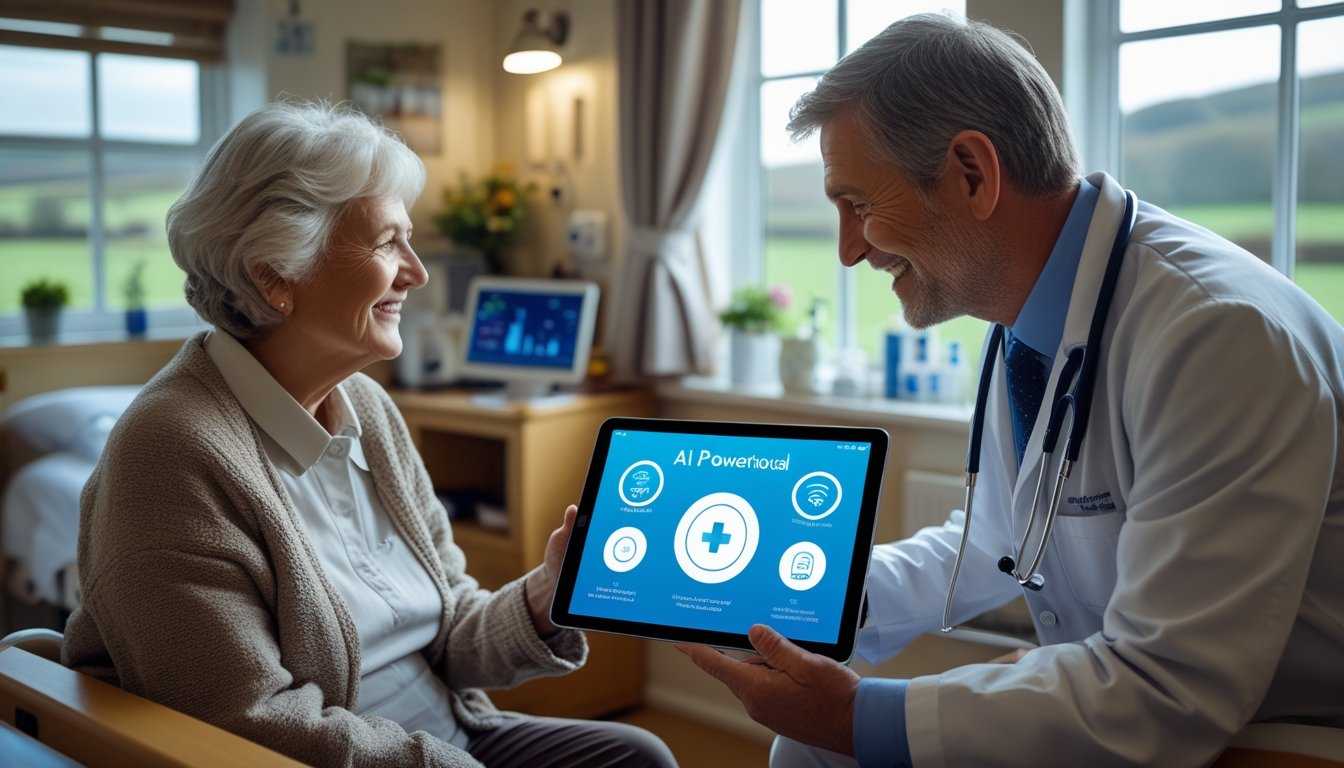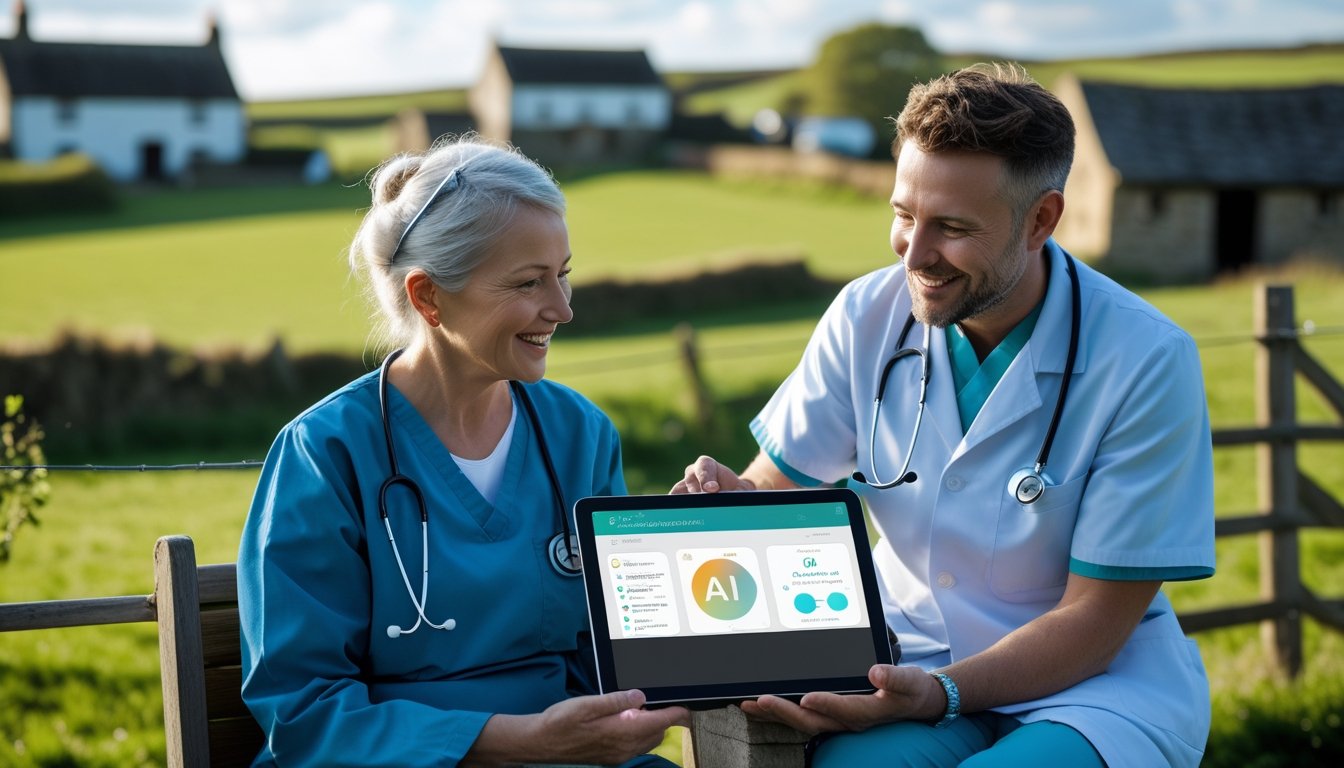Late updated: 01 Jul 2025 13:07
Written by: Oliver Bennett
Leveraging AI To Enhance UK Rural Healthcare Access: Improving Efficiency and Patient Outcomes
In the heart of our rural UK communities, healthcare accessibility remains a pressing issue. We have an opportunity to harness the power of artificial intelligence to rewrite this narrative. By leveraging AI solutions, we can significantly enhance healthcare access, bridging the gap between remote localities and comprehensive medical support. This transformation is not only promising but necessary for the revitalisation of rural healthcare systems.

Artificial intelligence offers innovative solutions that can transform how we approach rural healthcare challenges. Remote diagnostics, AI-driven data management, and predictive analytics are just a few ways we can target shortcomings in healthcare infrastructure. These tools hold the potential to drastically improve both preventative and emergency care in underserved areas, empowering these communities with quality healthcare access.
Together, as we explore these AI innovations, we stand at the cusp of a healthcare revolution. Our journey into AI-assisted healthcare promises to deliver more accurate, equitable, and efficient medical services to rural populations. Through collaboration and innovation, we can make this vision a reality for our rural neighbours.
Key Takeaways
- AI improves healthcare access in rural UK areas.
- AI addresses challenges and enhances service equity.
- Our article includes FAQs on rural healthcare and AI.
Transforming Rural Healthcare Access in the UK With AI
Artificial intelligence (AI) is reshaping the landscape of rural healthcare in the UK. We focus on AI-enhanced diagnostics and how it guides clinical decisions, the development of telemedicine, and strategies that optimise healthcare resources.
Enhancing Diagnostics and Clinical Decision-Making
Machine learning algorithms are at the forefront of improving diagnostic accuracy in rural areas, addressing the gap created by limited access to specialists. AI assists in diagnosing conditions more rapidly and with greater precision, thereby facilitating timely treatment.
AI technology supports clinical decision-making by integrating with electronic health records. These AI systems analyse patient data to provide personalised treatment plans, improving patient outcomes. This is particularly beneficial for chronic disease management, where ongoing monitoring is crucial.
Predictive analytics help identify at-risk patients, enabling proactive healthcare measures. This reduces the likelihood of complications and diminishes the strain on healthcare resources. Overall, AI enhances diagnostics by streamlining workflows and ensuring effective healthcare delivery.
Expanding Telemedicine and Digital Health Solutions
Telemedicine is rapidly closing the healthcare accessibility gap for rural populations, where travel can be a barrier to receiving timely care. AI-powered telehealth platforms enable remote consultations, providing patients with access to specialists without leaving their communities.
Wearable devices and remote monitoring technologies transmit real-time health data to clinicians, ensuring effective management of chronic conditions. These technologies empower patients to engage actively in their health care, fostering a collaborative healthcare environment.
Virtual and augmented reality tools provide immersive experiences for both patients and providers. This aids in patient education and offers innovative ways to conduct remote clinical training sessions, which ensures continued professional development for rural healthcare professionals.
Optimising Resource Allocation and Operational Efficiency
AI algorithms aid in the strategic allocation of healthcare resources, ensuring that rural facilities operate with maximum efficiency and have the necessary support to meet patient needs. This involves optimising staffing levels, supply management, and service delivery through advanced data analytics.
By analysing patient flow and service demand patterns, AI enhances operational efficiency. It allows healthcare administrators to anticipate peak times and allocate resources accordingly, ensuring minimal waiting times and improved patient satisfaction.
Efficiency gains achieved through AI also lead to better health outcomes. Patients benefit from reduced costs and improved accessibility, while healthcare providers gain from more streamlined operations, leaving more time for direct patient care and interaction.
Addressing Challenges and Advancing Equity in Rural Health Through AI

Rural healthcare presents unique challenges. Artificial Intelligence (AI) provides viable solutions by improving internet connectivity and ensuring ethical data use. Our focus here is on enhancing access while maintaining trust and integrity.
Bridging the Digital Divide and Improving Connectivity
Connectivity remains a significant barrier for rural communities. AI technologies call for robust digital infrastructure to function effectively. Remote areas often suffer due to inadequate internet access, obstructing the delivery of digital health services.
To tackle this, government initiatives should prioritise improving broadband availability. Public and private partnerships could also bring better telecommunication services. Improving digital literacy among healthcare providers and patients alike will empower them to utilise AI-driven tools effectively. This digital transformation opens up opportunities for better health information exchange and patient engagement, ultimately boosting health literacy and access.
Building Trust, Ethics, and Data Privacy
Patient data privacy is crucial. AI in healthcare demands rigorous governance and ethical frameworks. Establishing these guidelines reassures rural populations that their personal health information is secure. Addressing privacy and confidentiality concerns is essential for gaining public trust.
Integrating AI seamlessly requires clarity on data use and access. Our responsibility is to engage with healthcare professionals and the communities they serve. By facilitating discussions on privacy norms and ethical considerations, we can head off potential issues that might deter participation. In doing so, AI can serve as a trusted ally in enhancing rural healthcare services and providing equitable health solutions.
Frequently Asked Questions

Our exploration of AI in rural healthcare touches on several critical areas, such as prediction and management of healthcare needs, cost implications, and the enhancement of healthcare professional training and support. Additionally, we address the challenge of limited resources, data privacy, and the benefits of AI-powered telemedicine in remote communities.
How can artificial intelligence be used to predict and manage healthcare needs in rural areas?
AI can analyse large datasets to predict disease outbreaks and patient needs. Machine learning algorithms assess patterns in patient data, improving early detection and management of chronic conditions, which is crucial in areas with limited access to specialists.
What are the cost implications of integrating AI systems into rural healthcare networks?
Integrating AI is initially costly due to technology acquisition and training. However, AI offers long-term savings by streamlining operations and reducing unnecessary hospital visits. Over time, AI can enhance efficiency and patient outcomes, justifying the investment needed.
In what ways can AI contribute to the training and support of healthcare professionals in remote locations?
AI facilitates remote training through virtual simulations and personalised learning modules. It provides decision support with digital resources and access to a broader knowledge base, empowering professionals to deliver quality care with up-to-date medical practices.
How does AI address the challenge of limited medical resources in the UK's countryside?
By optimising resource allocation, AI ensures essential items are available where they're needed most. It helps manage supply chains and predict demand for medications and equipment, reducing shortages and enhancing care delivery across rural areas.
What role does data privacy play in the deployment of AI for healthcare services in rural regions?
Data privacy is paramount, with compliance to regulations like GDPR ensuring patient information is protected. Robust encryption and access controls are critical for maintaining trust and enabling the ethical use of AI in healthcare.
How can telemedicine, powered by AI, improve patient outcomes in less accessible communities?
AI-driven telemedicine offers remote consultations, breaking geographical barriers and enabling timely interventions. It enhances diagnostic accuracy and ensures continuous monitoring of chronic conditions, leading to better patient outcomes in isolated communities.
